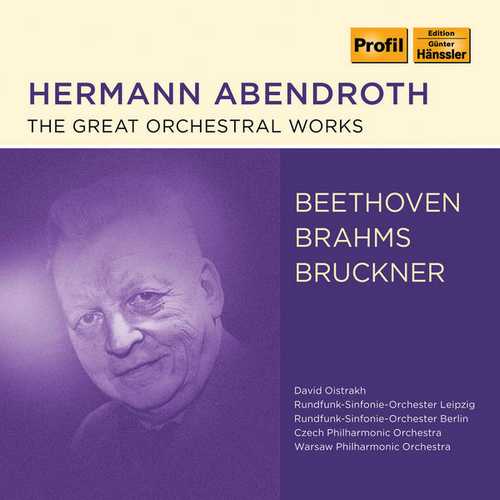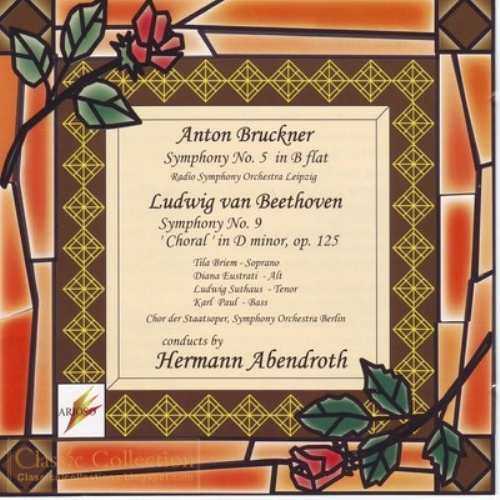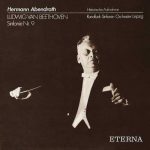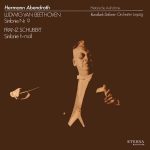
Composer: Ludwig van Beethoven, Johannes Brahms, Anton Bruckner
Performer: David Oistrakh, Tilla Briem, Diana Eustrati, Ludwig Suthaus, Karl Paul, Konzertchor der Staatsoper Berlin
Orchestra: MDR Sinfonieorchester, Berlin Radio Symphony Orchestra, Gewandhausorchester Leipzig, Czech Philharmonic Orchestra, Warsaw Philharmonic Orchestra
Conductor: Hermann Abendroth
Number of Discs: 10
Format: FLAC (tracks)
Label: Profil Medien
Catalogue: PH19000
Release: 2019
Size: 2.49 GB
Recovery: +3%
Scan: yes
CD 01
Bruckner: Symphony No. 4 in Eb Major ‘Romantic’
01. I. Bewegt, nicht zu schnell
02. II. Andante quasi allegretto
03. III. Scherzo. Bewegt
04. IV. Finale. Bewegt, doch nicht zu schnell
CD 02
Bruckner: Symphony No. 5 in B flat major
01. I. Introduction. Adagio – Allegro
02. II. Adagio. Sehr langsam
03. III. Scherzo. Molto vivace
04. IV. Finale. Adagio – Allegro moderato
CD 03
Bruckner: Symphony No. 7 in E Major (Live)
01. I. Allegro moderato
02. II. Adagio. Sehr feierlich und sehr langsam
03. III. Scherzo. Sehr schnell
04. IV. Finale. Bewegt, doch nicht schnell
CD 04
Bruckner: Symphony No. 9 in D Minor
01. I. Feierlich, misterioso
02. II. Scherzo. Bewegt, lebhaft
03. III. Adagio. Langsam, feierlich
CD 05
Brahms: Symphony No. 1 in C minor, Op. 68
01. I. Un poco sostenuto – Allegro
02. II. Andante sostenuto
03. III. Un poco allegretto e grazioso
04. IV. Adagio – Allegro non troppo, ma con brio
Brahms: Variations on a theme by Haydn for orchestra, Op. 56a ‘St Anthony Variations’
05. Theme. Andante
06. Var. 1, Poco più animato
07. Var. 2, Più vivace
08. Var. 3, Con moto
09. Var. 4, Andante con moto
10. Var. 5, Vivace
11. Var. 6, Vivace
12. Var. 7, Grazioso
13. Var. 8, Presto non troppo
14. Finale. Andante
CD 06
01. Brahms: Tragic Overture, Op. 81
Brahms: Symphony No. 3 in F major, Op. 90
02. I. Allegro con brio
03. II. Andante
04. III. Poco allegretto
05. IV. Allegro
CD 07
01. Beethoven: Romance No. 1 for Violin and Orchestra in G major, Op. 40
Beethoven: Violin Concerto in D major, Op. 61 (Live)
02. I. Allegro ma non troppo
03. II. Larghetto
04. III. Rondo. Allegro
CD 08
Beethoven: Symphony No. 3 in E flat major, Op. 55 ‘Eroica’
01. I. Allegro con brio
02. II. Marcia funebre. Adagio assai
03. III. Scherzo. Allegro vivace
04. IV. Finale. Allegro molto
CD 09
Beethoven: Symphony No. 6 in F major, Op. 68 ‘Pastoral’
01. I. Erwachen heiterer Gefühle bei der Ankunft auf dem Lande. Allegro ma non troppo
02. II. Szene am Bach. Andante molto moto
03. III. Lustiges Zusammensein der Landleute. Allegro
04. IV. Gewitter, Sturm. Allegro
05. V. Hirtengesang. Frohe, dankbare Gefühle nach dem Sturm. Allegretto
Beethoven: Symphony No. 7 in A major, Op. 92 (Live)
06. I. Poco sostenuto – Vivace
07. II. Allegretto
08. III. Presto
09. IV. Allegro con brio
CD 10
Beethoven: Symphony No. 9 in D minor, Op. 125 ‘Choral’
01. I. Allegro ma non troppo, un poco maestoso
02. II. Scherzo. Molto vivace – Presto
03. III. Adagio molto e cantabile
04. IV. Finale. Presto
Hermann Abendroth (1883–1956) was just three years older than Wilhelm Furtwängler. These two great conductors of the German Romantic orchestral tradition remained in their senior posts during the Third Reich – Furtwängler in Berlin, Abendroth in Leipzig – and suffered the consequences in the early post-war period of not having openly opposed the Nazi regime. After working in Munich, Lübeck and Essen in the early years of his career, Abendroth was from 1915 to 1934 leader of the Gürzenich Orchestra in Cologne and from 1925 director of the city’s conservatory and of the Music Festival of the Lower Rhine, becoming director of the Gewandhaus Orchestra in Leipzig in 1934 after Bruno Walter was forced out by the Nazis. Even as late as March 1945 Abendroth was conducting what were presumably the last symphonic works performed there, to be heard on the albums of this collection alongside Bruckner’s Seventh recorded in February 1956, just a few months before his death on May 29 of that year. When his work at the Gewandhaus came to an end in 1945 Abendroth initially found a new field of activity with the newly constituted Radio Symphony Orchestra of Leipzig, later assuming a similar position in Berlin, where he was able to pass on to the post-war orchestral generation the experience of his successful conducting career. He had gained the requisite know-how in the early years of his training, since one of his teachers was Felix Mottl, who from 1886 to 1906 was one of the most important conductors in Bayreuth, to whom posterity is indebted for the orchestral arrangement of Wagner’s Wesendonck Lieder.



